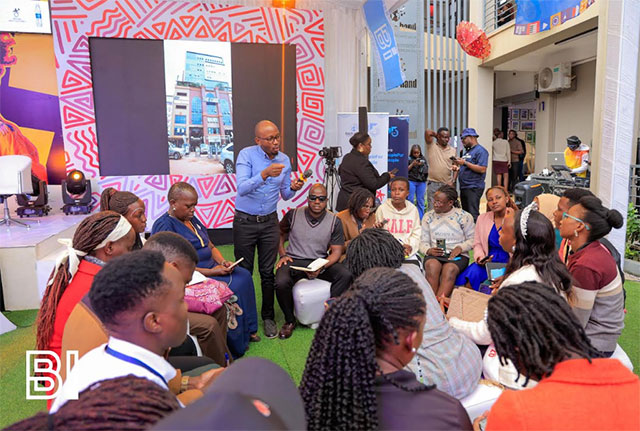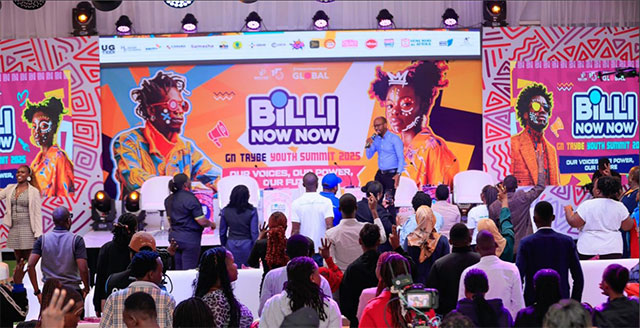
Kampala, Uganda | THE INDEPENDENT | Reach A Hand Uganda (RAHU) has held the third Billi Now Now (BNN) summit, an annual event under the Billi Now Now Movement. The summit was held at Reach A Head Headquarters in Lungujja in partnership with GN Trybe July 10th and 11th 2025, under the theme ‘’Our Voices. Our Power. Our Future.’’
The Billi Now Now (BNN) is a youth-led movement empowering over 1 billion BRAVE young people (B!LL!s) to take charge of their lives, health, and future. GN Trybe is a youth-centered behavioral change communication initiative designed to respond to the evolving challenges young people face today. The initiative uses bold and innovative strategies to raise awareness and reduce sexual and reproductive health (SRHR) risks that often limit young people’s right to quality education, mental well-being, and a healthy, empowered life.
The summit addressed topical youth issues, including economic empowerment, the role of media in promoting youth issues, healthy relationships, safeguarding, technology-facilitated gender-based violence, and youth and civic space, among others.
The summit attracted over 300 youth delegates from Uganda, Kenya, Rwanda, South Sudan, Ethiopia, Senegal, Benin, Peru and Burkina Faso to have conversations around Africa reclaiming its identity and leveraging the power of youth voices to drive meaningful change.
As part of the activities that took place during the summit was the unveiling of the inaugural Impact Forge cohort. This program is part of RAHU’s youth empowerment efforts to provide support for youth-led and youth-founded organisations. The initiative provides a year-long mentorship, capacity building, and access to resources to ensure that the participants succeed and thrive.
The cohort comprises 15 participants across various industries such as agriculture, climate change, youth livelihood, education, and social behavioral change.
Speaking at the BNN summit, Humphrey Nabimanya, Chief Executive Officer of Reach A Hand Uganda, emphasized, “Billi Now Now has produced a generation of changemakers who are now advocating for the youth of today and tomorrow.”
Mariam Nalukuma, Head of Corporate Affairs at the Insurance Regulatory Authority, spoke about the importance of economic empowerment through financial literacy.
“One of the biggest challenges we face in Africa is unemployment,” she said. “Across the world, young people are carrying the burden of securing the future. In today’s world, financial literacy is critical for financial resilience. Insurance is one of the key tools for financial protection. Even those without formal employment can take advantage of affordable insurance packages to secure their future against unforeseen circumstances such as untimely death or accidents.”

Dr Ruth Grace Kakoba, a gynecologist and content creator, highlighted how media can either be healing or harmful, depending on how it is used.
She pointed to emerging social media trends, such as the hashtag #TeenMom, where young girls who become pregnant at 18 portray teenage motherhood as trendy or glamorous.
“These trends can be misleading,” she said. “They often ignore the serious health risks and long-term effects of teenage pregnancy on a young girl’s body and future.”
She emphasized the importance of responsible media content that educates rather than glamorises, warning that unchecked trends can normalise harmful behavior among youth.
Herbert Mugumya, Chief of Staff at the International Rescue Committee, challenged traditional notions of masculinity during his address. He explained that being a man is largely a social construct, shaped by upbringing, societal expectations, and reproductive roles.
“What defines a man is not wealth or dominance, but responsibility and emotional maturity,” Mugumya said.
He further critiqued outdated beliefs that discourage men from expressing vulnerability, such as the idea that a man should not cry, not even at a burial.
“Traditional masculinity, which associates manhood with stoicism and power, can be harmful. Real strength lies in emotional openness, care for family, and responsible living,” he added.
 The Independent Uganda: You get the Truth we Pay the Price
The Independent Uganda: You get the Truth we Pay the Price



